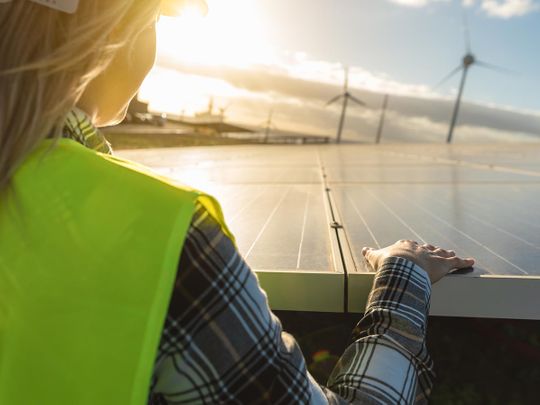
Climate change is one of the most urgent and complex challenges of our time. Yet, there may be a simple solution in sight - place women at the center of sustainable development.
Women play a leading role in managing, conserving and using natural resources as consumers and community educators. But they face serious limitations in accessing and controlling these resources, due to their underrepresentation in decision-making spaces.
Globally, women and girls experience the greatest impacts of climate change, which amplifies existing inequalities and poses threats to their livelihoods and safety. Yet, we also know that when women are empowered, it results in higher levels of economic, social and environmental sustainability. To truly achieve sustainable development for all, women must be championed as agents of change.
Providing a ‘WISER’ platform
With this realization in mind, Abu Dhabi’s renewable energy company Masdar established the Women in Sustainability, Environment and Renewable Energy (WiSER) initiative in 2015. It aims to advance women’s participation in technology, policy, and leadership as it relates to renewable energy, climate change and sustainable development. This is done by taking practical steps to empower women, by providing training and mentorship.
Rising awareness of the positive impact of gender equality is accelerating women’s employment across sectors, including renewable energy. The current energy transition, which aims to expand renewables and decarbonize existing hydrocarbon-based energy systems, has created a significant opportunity for women.

And this representation will likely increase in the coming years as the renewable energy sector is expected to create 43 million jobs by 2050. With female representation increasing in renewable energy, the barrier for women’s entry into the sector will gradually decline. Cultural norms will shift as more women continue to enter the clean energy workforce.
A viable career indeed
This will have significant trickle-down effects, inspiring a growing number of young girls to see renewable energy as a viable career choice. As female representation in the clean energy industry increases, they will have the opportunity to generate remarkable growth in several industries linked to sustainability.
Climate action could create more than 65 million jobs in 2030—many of them in sustainable infrastructure fields like public transit and efficient buildings. Women’s success in the renewable energy sector will help them secure jobs in a broader range of fields, which in turn will improve environmental, economic and social benefits for all.
While women’s growing inclusion in renewable energy is encouraging, we must ensure the pace of their inclusion accelerates even more rapidly, and across the talent spectrum. Especially important is the need to speed up women’s representation in leadership and entrepreneurial positions.
As the world faces the devastating impacts of climate change, we require a diverse range of perspectives to tackle it. Entrepreneurs often bring innovations that open the door for novel technologies and markets that impact global sustainable development.
A presence in entrepreneur ranks
Boosting the number of women entrepreneurs will reduce poverty, increase GDP, and importantly, drive sustainable development around the world. While about 30 per cent of businesses are started by women, less than 2 per cent of venture capital goes to female-founded companies. This lack of financing means women don’t have the same opportunity to scale their impact.
Reducing barriers for women is one of the main goals of the WiSER platform. For example, we connect women, aged 25-35, with global experts who provide mentoring to develop leadership skills and innovative thinking. We also engage young women in active learning through community development. Earlier this year, a group of young professional women spent a week living in an off-grid community in Rwanda.
They worked with community members to gain a more in-depth understanding of how to tackle energy challenges. Programs like these give young women unique opportunities to upskill and advance their careers in climate-related roles.
Building and maintaining momentum to elevate more women as leaders in sustainable development is critical. Our #IAmWiser campaign was launched to highlight the huge impact women have in creating a sustainable world. We are calling on policymakers, industry leaders and the public to pledge support for women as agents of sustainable change.
We are providing a clear call for action for women and those who support them. I hope you will pledge with us and support us as we work to turn these pledges into concrete progress, so that more resources can be mobilized to help women enter and lead in renewable energy, climate change, and all areas that positively impact sustainable development.













